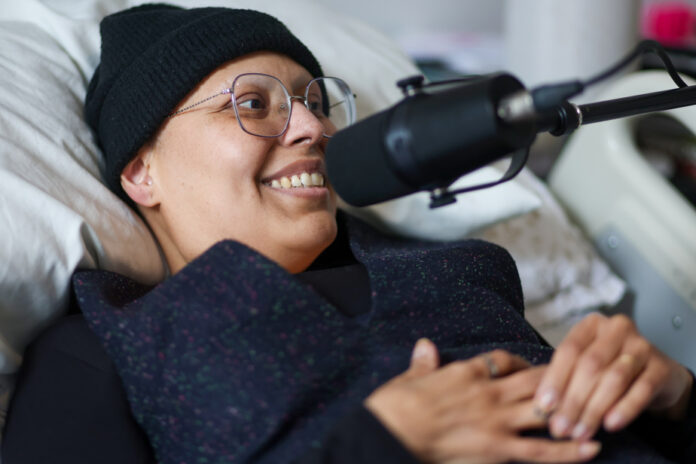I expected that, as during my last visit in February, it would be her husband, big Jacob, who greeted me, with Caroline right behind, in her wheelchair. But it was François Roy, my photographer colleague, who opened the door for me that Tuesday afternoon, at the writer Caroline Dawson’s house. Behind him: Alfredo, the father of our host who, today, will stay in his bed.
We can postpone our interview for another day, another week, another day, I quickly tell her, seeing her in her anthracite dress. But Caroline insists: there is no question of postponing our appointment, despite her flat batteries and the recent news that she must stop the chemotherapy cycles, in order to move on to another form of treatment, immunotherapy.
We make sure to set up the recording equipment properly while Caroline tells us that during her recent participation in another podcast show, still from her bed, a loose microphone fell right on her forehead. We laugh. Over the next hour, we laugh a lot, as much as we cry, under the languid gaze of Jackal, the family cat. As well as under that of Leonard Cohen, a poster of which, Caroline’s first gift to her husband, sits above the bed.
Why did she want us to meet, even if today isn’t her best day? “Because it’s not that bad,” she explains, “and I’ve always found that if I cancel all my things because I’m in pain, it means that I no longer live my life. life, that I am reclusive in the domestic sphere, and that makes me upset. »
“I was seven years old the first time I decided not to kill myself,” writes Caroline Dawson in her novel Là où je me terre (Éditions du stir-mage, 2020), which was followed at the beginning of this year by book of poems Ce qui est tu (Triptych). This is the first sentence, a shock, of a first chapter in which she remembers her fleeting, but sovereign, desire to throw herself out of the window at the moment when her parents tell her that the family will leave Chile for Canada.
“Only I didn’t jump,” she writes a little further on. Not out of apathy, not out of laziness. Faced with the call of nothingness, I made the first choice that counted. The life that stretched out before me took up all the space. I had just turned seven and taken my first act of faith towards the world which would now appear as a foreign perspective, an unknown point of view. »
How is Caroline’s faith in existence and the world when, for more than two years, another type of unknown point of view has been unfolding before her, that of an osteosarcoma to be tamed?
“She is stronger than ever,” replies the one who will soon be 44 years old with, behind her trembling voice, a conviction of reinforced concrete.
From her Chilean childhood, she writes, what will essentially remain is this desire to “embrace existence, even if to do so it was necessary to transfigure it.” And Caroline ardently believes in the power of literature to transfigure reality.
“I wrote this book because I wanted my mother to become a real character in Quebec literature,” she recalls, “and it was not obvious that we would find women of Latin American household. I wanted to do him this honor: you’re going to become a character and you’re going to exist in people’s heads, forever. »
The generosity of her heart is of incredible immensity and, yet, Caroline Dawson is not a jovialist or a fan of denial. If the flag of light is planted at one of the poles of his work, that of anger and indignation flies on the other.
“A beautiful story of a family who didn’t have it easy,” Prime Minister François Legault wrote on social networks about Where I Ground, a comically euphemistic formula for a work listing with such poignancy details the sacrifices that parents will have gone through in the name of the development of their children.
“I didn’t like it, I felt exploited,” Caroline remembers. I felt like my book was being taken to say nice things, but at the same time, did he read it for real? My book is not just that. My book talks about things you could improve on that you’re not doing. »
Despite everything that shocks her, all the decisions that could be made to allow newcomers to taste a sweeter life, Caroline nevertheless remains a citizen of the land of hope.
“Structures make me angry, but I love people,” she says. There are so many extraordinary people. You see it when you are in the hospital, that there are nurses who do much more than they should. Often I say to myself, “You don’t know me, why do you care for me with such kindness and concern?” There are many people in my life who have made a difference. That’s hope. »















